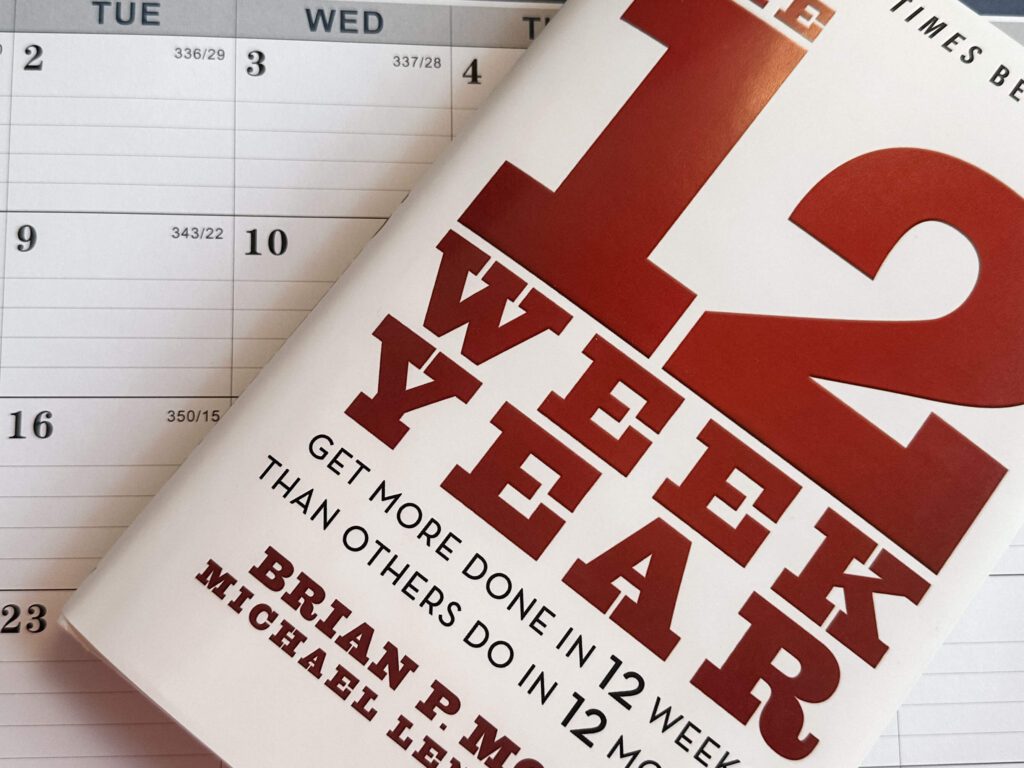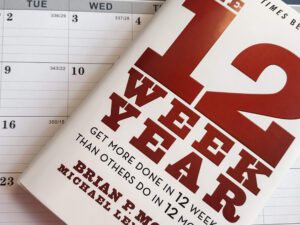The 12 Week Year—Get More Done In 12 Weeks Than Others Do In 12 Months by Brian P. Moran and Michael Lennington presents a structured approach to setting and achieving goals by treating a year as 12 weeks instead of 12 months. This book review explores how the system boosts productivity and transforms one’s desire to improve into a process of improvement.
Meet The Authors: Who are Brian P. Moran and Michael Lennington?
Brian P. Moran is the president and founder of The 12 Week Year, a New York Times bestselling author, a sought-after leadership speaker, and an execution expert with extensive experience in business consulting, coaching, and corporate management. He has worked with both world-class companies and small business owners, helping them improve productivity and achieve high performance.
Michael Lennington is a consultant, coach, and speaker who specializes in helping individuals and organizations close the execution gap to accomplish what they are capable of.
Breaking It Down: A Simple Summary
The 12 Week Year—Get More Done In 12 Weeks Than Others Do In 12 Months by Brian P. Moran and Michael Lennington challenges traditional annualized thinking by introducing an execution system that treats a year as 12 weeks rather than 12 months.
With the conventional annual planning approach, people set their goals at the beginning of the year, identifying what they hope to achieve by the end of it. Since 12 months feel like a long time, it’s easy to believe there is plenty of time to complete everything. As a result, falling behind in January, February, or even March doesn’t seem like a big deal because December still feels far away. In addition, most annual plans tend to include too many objectives, which is one of the main reasons execution often fails. In many cases, the final 60 days of the year become the most focused and productive period, simply because the deadline, December 31st, is near.
If deadlines motivate people and create a sense of urgency, why not set them earlier? Instead of waiting until the end of the year to experience the surge of energy, focus, and commitment, what if that same level of intensity were created every week? This is the core idea behind the 12-week-year framework.
With the 12-week-year system, a year is now just 12 weeks long. According to the authors, “12 weeks is long enough to get things done, yet short enough to create a sense of urgency.” It is important to note that this 12-week period is not a quarter of a year; it is a complete year in itself. At the end of each 12-week cycle, people can assess their performance, recognize and celebrate their progress and success, and start fresh with a new 12-week year.
The 12-week-year system offers many benefits. First, it forces people to eliminate low-value activities and focus only on the critical tasks that drive results. Second, it maintains a constant sense of urgency because the deadline is always in sight. Third, it encourages living in the present as every week, every day, and every moment becomes significant.
The 12-week year approach consists of multiple key steps:
✔️Step 1: Develop and maintain a clear and compelling personal vision. This vision keeps people engaged during challenging moments, as human nature often favors comfortable actions over uncomfortable ones. Furthermore, the vision must be greater than the present to inspire a higher level of performance.
✔️Step 2: Establish 12-week goals that are aligned with the long-term vision developed in Step 1.
✔️Step 3: Create a 12-week plan. Without a structured plan, a vision remains just a dream. Each goal is broken down into specific tactics, which are the critical actions that drive its attainment.
✔️Step 4: Derive the weekly plan from the 12-week plan.
These steps, combined with time blocking and performance measurement increase the likelihood of execution success. The system also emphasizes the importance of mindset, self-accountability, discipline, consistent execution, and striving for excellence over perfection.
As the authors state, “… most of us have two lives: the lives we live and the lives we are capable of living,” and the latter is the life that the authors believe we all deeply desire. The 12-week-year framework provides a roadmap for performing at one’s full potential every day to live the life one is capable of.
My Take: What Makes This Book Stand Out
What makes The 12 Week Year stand out from many other productivity books is its actionable framework. The book goes beyond theory and generic advice, offering a clear methodology for setting and achieving goals that can be applied at both the individual and organizational levels. While some books focus mainly on planning, The 12 Week Year brings execution to the center stage.
The book is organized into two parts. The first half explains the fundamental concepts and their roles in the 12-week-year execution system, while the second half presents a step-by-step guide that allows readers to implement the system immediately. It helps readers break down their long-term vision into specific, measurable 12-week goals, which are then translated into targeted weekly and daily actions. At each step, the authors identify common pitfalls and provide tips to increase success, ensuring that readers not only understand the framework but can also implement it effectively.
Accountability and commitment are two standout topics in the book. While accountability means recognizing that outcomes are driven by daily actions rather than external circumstances, commitment is a personal promise to oneself and others. Both are key ingredients for achieving breakthrough results in all areas within a compressed timeframe.
Although the book presents a compelling framework, some readers might find it longer than necessary, as key principles are reiterated multiple times. While repetition can help reinforce important lessons, too much may slow the reading experience for some.
Furthermore, while the authors lay out every step of the process, successfully implementing the 12-week-year system requires a high level of discipline and consistency to prevent reverting to old habits. As highlighted in the book, “Effective execution isn’t complicated, but it’s not necessarily easy, either.” It is because “execution invariably requires taking new actions, and new actions are often uncomfortable.” For those who commit to the process and push through the discomfort, the approach can lead to significant performance improvement and goal achievement.
Final Thoughts: Should You Read It?
Despite its length and repetition, The 12 Week Year is well worth the read for anyone looking to overcome procrastination, boost productivity, enhance focus, and accomplish more in less time. Whether applied to business, career, or personal goals, the book offers a practical framework for success—though it demands a high level of commitment, discipline, and consistency to fully implement.
Best Quotes from the Book
“This life isn’t driven by the you who settles or gives in to procrastination and doubt, but by the optimal you, the best you, the confident you, the healthy you.”
“Knowledge alone benefits no one unless the person acquiring it does something with it. And great ideas are worthless unless they are implemented.”
“It’s not what you know; it’s not even who you know; it’s what you implement that counts.”
“the number-one thing that you will have to sacrifice to be great, to achieve what you are capable of, and to execute your plans, is your comfort.”
“Vision is the starting point of all high performance. You create things twice; first mentally, then physically.”
“The most important thing is to believe that you can reach your goals.”
“Long-term results are created by the actions you take every day.”
“Intentionality is your secret weapon in your war on mediocrity.”
“At the end of the day, the only accountability that truly exists is self-accountability.”
“Learning to do the things you need to do, regardless of how you feel, is a core discipline for success.”
“You are most effective when you are mentally where you are physically—when you are present in the moment.”
“Results are not the attainment of greatness, but simply confirmation of it.”
“A commitment is a personal promise. Keeping your promises to others builds trust and strong relationships, and keeping promises to yourself builds character, esteem, and success.”
“Everything cannot be a priority. You will need to say no to some things in order to be great at the things that matter most.”
“As long as we continue to be victims of our circumstances, we will experience life as a struggle and others as a threat.”
“Failures simply become feedback in the ongoing process of becoming excellent.”





